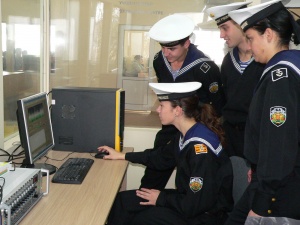
The Center conducts not only theoretical and experimental research activities but also provides training for students, cadets, interns, graduates, and PhD candidates in its areas of expertise.The Center has qualified specialists and a modern material base for delivering lectures, conducting laboratory exercises, practical training, and internships, as well as for the development of graduation projects and doctoral dissertations in the fields of maritime technology, marine and river transport, ocean and coastal engineering, and environmental protection.In the field of education, the Center maintains diverse forms of collaboration with universities in the region and the country.Internships for students from other European countries, as well as work on European projects and applied industrial tasks, offer students and PhD candidates opportunities to participate in the Center’s research activities and international forums, establish contacts with foreign students and leading experts from various countries, and gain practical experience in developing joint projects within integrated teams.
Under the guidance of experienced professionals and with the assistance of methodologies and instructions, students, interns, and PhD candidates can acquire skills in preparing and conducting model testing in the Center’s specialized experimental facilities. They also become acquainted with numerical hydrodynamics and aerodynamics methods, work with modern software products, and gain experience in using CAD-CAM systems to generate 3D models and manufacture products with complex geometries.
The Center has the resources and infrastructure to conduct research activities and to support highly qualified specialists on projects of mutual interest.
The Center is accredited by the National Agency for Evaluation and Accreditation (NEAA) to offer PhD training in the following doctoral programs:
- “Ship Theory” in professional field 5.5 “Transport, Shipping, and Aviation,” higher education area “Technical Sciences” (scientific specialty code 02.03.01):
- The first accreditation was awarded with a “very good” rating on a four-point scale by decision of the Permanent Commission on Technical Sciences and Military Affairs of the NEAA (Protocol No. 41/01.12.2006);
- The second accreditation, received by decision of the same commission on May 30, 2013 (Protocol No. 15), was rated 9.42 on a ten-point scale for a six-year term;
- The third accreditation was granted by the Permanent Commission on Technical Sciences of the NEAA on June 21, 2019 (Protocol No. 18) with a score of 9.42, again for a six-year term.
- “Fluid Mechanics” in professional field 4.5 “Mathematics,” higher education area 4 “Natural Sciences, Mathematics, and Informatics” (scientific specialty code 01.02.05):
- The first accreditation of this doctoral program was awarded with a “very good” rating on a four-point scale by decision of the Permanent Commission on Natural Sciences, Mathematics, and Informatics of the NEAA (Protocol No. 2/12.11.2009) for a six-year term;
- The second accreditation, granted by decision of the same commission (Protocol No. 4/15.02.2016), was rated 8.67 for a five-year term;
- The third accreditation was granted by decision of the NEAA Accreditation Council (Protocol No. 16/30.06.2022) with an overall score of 8.16 for a four-year term.
- “River and Marine Construction” in professional field 5.7 “Architecture, Construction, and Geodesy,” higher education area “Technical Sciences” (scientific specialty code 02.15.17):
- The first accreditation was awarded with a “very good” rating on a four-point scale by decision of the Permanent Commission on Technical Sciences and Military Affairs of the NEAA in December 2009 (Protocol No. 44) for a six-year term;
- The second accreditation was awarded by decision of the Permanent Commission on Technical Sciences (Protocol No. 18/20.05.2016) with an overall score of 9.36 on a ten-point scale for a six-year term.
